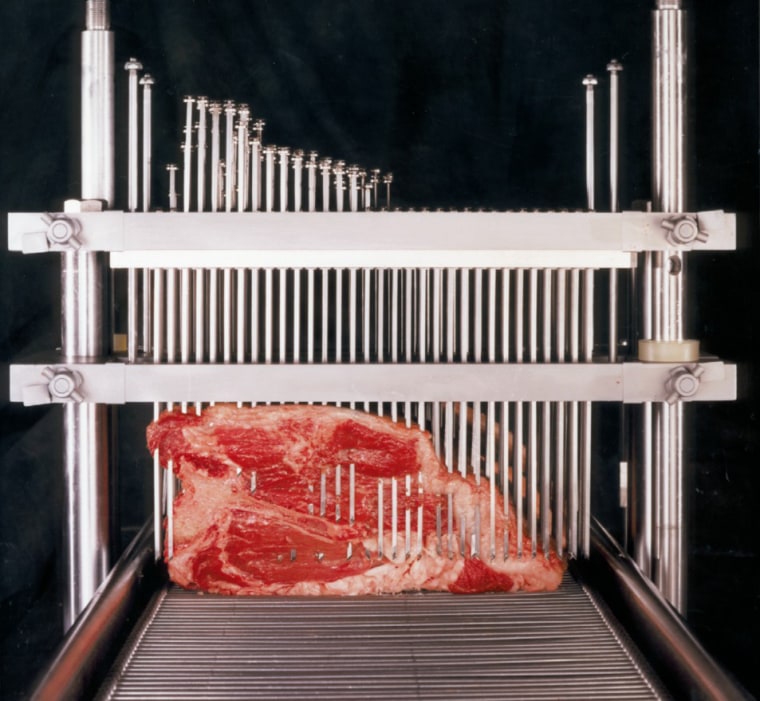On the eve of summer grilling season, the recall of more than a ton of beef potentially contaminated with dangerous E. coli bacteria -- including mechanically tenderized sirloin steaks -- is renewing calls for better labeling.
Connecticut Rep. Rosa L. DeLauro said that the Wednesday recall involving some 2,057 pounds of ground and texturized beef from Town & Country Foods Inc. of Greene, Maine, underscores why consumers should be told when meat has been mechanically pierced with needles or blades.
“Thankfully, thus far there have not been any illnesses associated with this recall, but these products must be labeled to protect American consumers in the future,” DeLauro said in a statement.
Mechanical tenderization is typically used on tougher cuts of beef or pork to break down muscle fibers or to inject marinade into meat. About 50 million pounds of needle- or blade-tenderized meat is produced in the U.S. each month, according to a federal study, but it’s not required to be labeled.
Food safety advocates say the tenderized meat may increase the risk of foodborne illness because the needles or blades can drive bacteria deep inside. Federal officials already advise consumers to cook so-called “non-intact” steaks to a higher temperature -- 160 degrees -- for safety.
But meat industry officials and even a former federal agriculture leader say they’re not convinced of the risk of illness -- or that it’s worth slapping a label on every package, possibly discouraging consumption.
“We think it’s important that a good analysis be done before regulatory action is taken,” said Janet Riley, a spokeswoman for the American Meat Institute.
U.S. Department of Agriculture Food Safety and Inspection Service officials said the Town & Country Foods meat was shipped from April 4 to April 10 and included hamburger patties, stewing beef and sirloin fillets. The problem was discovered when company lab tests confirmed E. coli O157:H7 after the meat already had gone out, resulting in the recall.
On Monday, two days before the recall, DeLauro had sent a letter urging the U.S. Department of Agriculture to require labels advising higher cooking temperatures to kill E. coli O157:H7 bacteria. The Democrat has been a longtime advocate of labeling.
“Accurate and appropriate labeling is critical in enabling consumers to make informed purchase decisions and also in ensuring proper food handling and safety,” DeLauro’s letter said.
Her view apparently has the support of Dr. Elisabeth Hagen, the U.S. undersecretary for food safety who told a congressional committee earlier last month: “We do believe they should be labeled,” as the blog Food Safety News reported.
But it’s at odds with meat industry officials, who say there hasn’t been enough research to tell if the mechanical process actually raises the risk of foodborne illness. Riley said some research indicates the problem may be associated with needle-marinated meat and not blade-tenderized meat.
And Dr. Richard Raymond, the former USDA official who previously held Hagen’s job, says he wasn’t convinced in the past and isn’t convinced now that labeling is necessary.
“The risk of choking and dying on that steak is far greater,” than the risk of E. coli poisoning, Raymond said.
He added that reported illnesses associated with tenderized meat have been very small compared to the volume of product.
In December 2009, some 248,000 pounds of tenderized beef were recalled after being linked to 21 E. coli O157:H7 infections in 16 states. Six months earlier, food safety advocates had warned the USDA of the risk of foodborne illness in mechanically tenderized meat.
Since then, the USDA has been considering whether to add labels warning that the products are “non-intact” and should be cooked to a higher temperature. USDA guidelines say that a whole cut steak should be cooked to an internal temperature of 145 degrees. But because the process can introduce bacteria into the middle of the meat, the agency recommends that non-intact steaks be cooked to 160 degrees, like hamburger.
Raymond said that could discourage rare meat fans from buying the product, or encourage consumers to simply ignore the warning.
In her letter to the USDA, DeLauro said she was encouraged that Hagen supported labeling during the hearing of the House agriculture appropriations subcommittee last month.
“But it has been working on the issue since at least 2009,” she noted. “Continued inaction only puts the public at risk.”
Related:
'Pink slime in your meat?' Labels to tell you
3 big brands may be tied to chicken jerky illness in dogs, FDA records show
